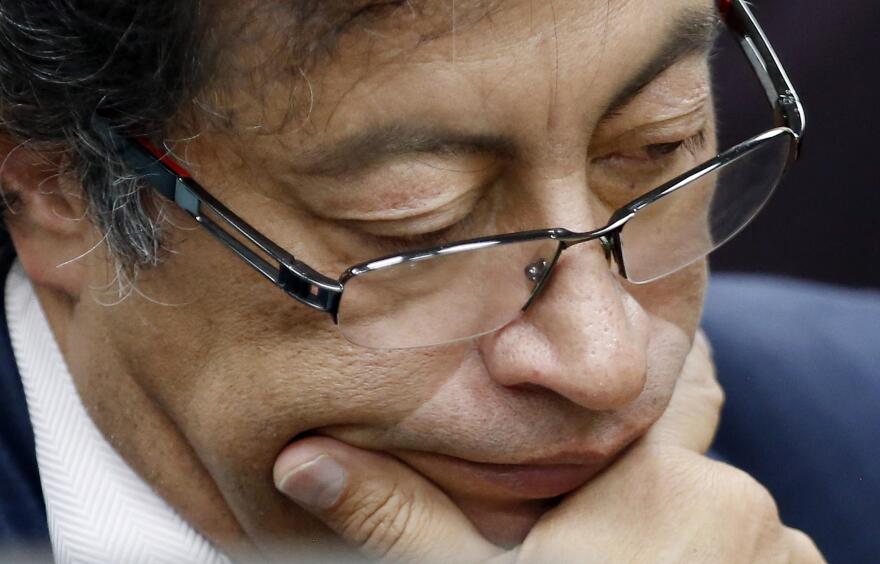A new poll shows Colombia’s front-running presidential candidate, leftist Senator Gustavo Petro, widening his lead to 21 points over his right-wing competitor in the May 29 election. Supporters of the former M-19 guerrilla rebel are already raising glasses of aguardiente.
They’d be smart for now to pour it back in the bottle.
WLRN is committed to providing the trusted news and local reporting you rely on. Please keep WLRN strong with your support today. Donate now. Thank you.
This isn’t exactly a Gallup poll: the firm that conducted it, CELAG, has a fairly leftist reputation itself; and it comes on the heels of other, more reliable surveys that indicate Petro’s conservative rival, former Medellín Mayor Federico Gutiérrez, is in fact closing the gap.
The Petro Posse should look instead at recent polls in Chile. Left-wing President Gabriel Boric’s approval rating is falling like magnum bottles of Carménère from a collapsed Santiago wine shelf — as low as 28%. Boric only took office last month, riding the same wave of reformist rage that Petro’s been surfing in Colombia.
What should Planet Petro take from the sudden Boric Bashing? That in the Americas, there’s a relatively low tolerance threshold for the left — even when it wins.
READ MORE: Yes, it's personal in South Florida — but that doesn't make it good policy in Latin America
Yes, Boric — at 36 the youngest president in Chile’s history — won December’s election in a landslide against his own right-wing rival. Chile’s democracy is one of Latin America’s most stable and prosperous; but it’s also one of the hemisphere’s most economically unequal and socially non-inclusive. Massive, angry street protests in recent years left little doubt about that.
But, as in the rest of Latin America, there is nonetheless a dogged conservative streak in Chile's political DNA (even though appalling sexual abuse scandals involving Chile’s Roman Catholic church have helped soften that conservatism in the past decade). That meant Boric had little room for error as soon as he was sworn in.
What should Planet Petro take from the sudden Boric Bashing? The reality that in the Americas, there's a relatively low tolerance threshold for the left — even when it wins.
Ironically, Boric’s nascent standing has been chopped down in large part by something Chileans were clamoring for most: a new, more democratic national Constitution to replace the one written during the brutal, right-wing Pinochet dictatorship half a century ago. In polls released this month, most Chileans now say they reject the charter being drafted by mostly leftist and independent delegates. What they’re spurning is the sort of liberal overreach that time and again pulls the rug out from under the progressive cause in the Western Hemisphere — including the U.S.
Among the radical ideas spooking them: a proposal to trash the three branches of government and replace them with a 600-member “assembly of workers and peoples;” and a plan for dumping private pension funds for a publicly run system as the only pension option. Even Boric questions some of those socialista-sounding schemes.
LEFTY PETULANCE
This should resonate right now in Colombia because Petro is pushing much the same pension project — and recently called a columnist who criticized it a “neo-Nazi.” That sort of lefty petulance only alienates the independent voters who polls suggest may be stepping away from Petro in numbers he shouldn’t ignore.
Some liberals might roll their eyes because I’m writing this from Miami, where most Colombian expats consider Petro the Antichrist. But even moderate and liberal Colombian-Americans here agree Petro could still lose a race that’s his to lose — and that if he wins, he could spin into a ditch just as quickly as Boric has.

“Petro needs to understand that political capital doesn’t last forever,” said Jose Parra, the Colombian-American CEO of the communications firm Prospero Latino in Miami, and a Democrat.
“He needs to spend less time conveying hubris and more time building reservoirs of credibility across the political spectrum so Colombia’s peace agreement can finally be implemented.”
Like Chile, Colombia is a grossly inegalitarian and non-inclusive country. That won’t change until the urgent socio-economic reforms built into the 2016 pact that ended Colombia’s half-century-long civil war are carried out and not just talked about. Current President Iván Duque and the Colombian right all but refuse to tackle them because, in their own petulance, they reject the peace deal.
As a result, many Colombians now consider Petro to be the deal’s only hope of realization, since Colombia’s centrist presidential candidate is barely polling in double digits.
Petro has a month now before the election — and probably about as long afterward if he wins — to keep from pulling the rug out from under that cause.






